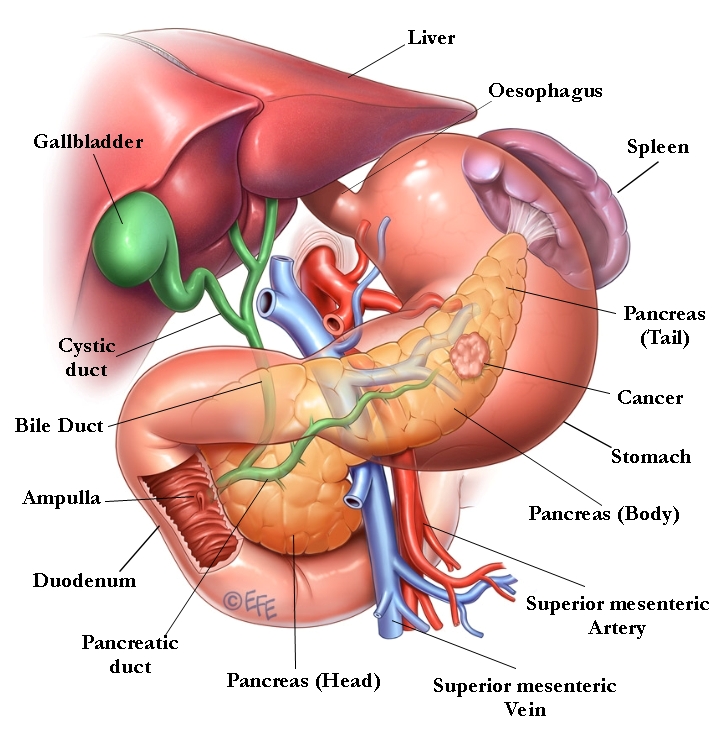Pancreatic Cancer Causes, Symptoms, Diagnosis and Treatment

What Is Pancreatic Cancer?
Pancreatic cancer arises when cells in the pancreas, a glandular organ behind the stomach, begin to multiply out of control and form a mass.
These cancerous cells have the ability to invade other parts of the body.
Pancreatic cancer often has a poor prognosis, even when diagnosed early. Pancreatic cancer typically spreads rapidly and is seldom detected in its early stages, which is a major reason why it’s a leading cause of cancer death.
As pancreatic cancer progresses, it can cause a series of complications such as:
- Jaundice.
Pancreatic cancer that blocks the liver’s bile duct can cause jaundice. Signs include yellow skin and eyes, dark-colored urine, and pale-colored stools. - Pain.
A growing tumor may press on nerves in the abdomen, causing pain that can become severe. - Bowel obstruction.
Pancreatic cancer that grows into or presses on the small intestine (duodenum) can block the flow of digested food from the stomach into theintestines. - Weight loss.
Causes Of Pancreatic Cancer:
It’s not clear what causes pancreatic cancer.
Pancreatic cancer occurs when cells in the pancreas develop mutations in their DNA. These mutations cause cells to grow uncontrollably and to continue living after normal cells would die. These accumulating cells can form a tumor.
Most pancreatic cancer begins in the cells that line the ducts of the pancreas. This type of cancer is called pancreatic adenocarcinoma or pancreatic exocrine cancer.
Possible Factors Which Increases The Risk Of Developing Pancreatic Cancer Includes:
- African-American race
- Excess body weight
- Chronic inflammation of the pancreas (pancreatitis)
- Diabetes
- Family history of genetic syndromes that can increase cancer risk, including a BRCA2 gene mutation, Lynch syndrome and familial atypical mole-malignant melanoma (FAMMM)
- Personal or family history of pancreatic cancer
- Smoking
Symptoms Of Pancreatic Cancer:
Normally, no signs and symptoms are exhibited.
However if they do occur, signs and symptoms may include:
- Upper abdominal pain that may radiate to the back
- Yellowing of the skin and the whites of the eyes (jaundice)
- Loss of appetite
- Weight loss
- Depression
- Blood clots
Diagnosis Of Pancreatic Cancer:
Pancreatic cancer can be diagnosed via:
- Imaging tests, which help the doctor, visualize the internal organs, including pancreas.
Ultrasound
computerized tomography (CT) scan
Magnetic resonance imaging (MRI). - Using a scope to create ultrasound pictures of the pancreas.
- Using a scope to inject dye into the pancreatic ducts.
Endoscopic retrograde cholangiopancreatography (ERCP) - Removing a tissue sample for testing (biopsy).
Treatment Of Pancreatic Cancer:
The following treatment options are available:
- Surgery
Surgery for tumors in the pancreatic head.
Surgery for tumors in the pancreatic tail and body. - Radiation therapy
- Chemotherapy
- Targeted therapy
erlotinib (Tarceva) - Clinical trials
Related Articles:
Esophageal Cancer Causes, Symptoms, Diagnosis and Treatment
Thyroid Cancer Causes, Symptoms, Diagnosis and Treatment
Vaginal Cancer Causes, Symptoms, Diagnosis and Treatment
Rectal Cancer Causes, Symptoms, Diagnosis and Treatment
Testicular Cancer Causes, Symptoms, Diagnosis and Treatment
Vulvar Cancer Causes, Symptoms, Diagnosis and Treatment
Gallbladder Cancer Causes, Symptoms, Diagnosis and Treatment
Case Seeking Cancer Screenings Heads To Trial
Solid Organ Transplant Patients At Higher Cancer Death Risk
A Sort Of Prostate Cancer Treatment May Upsurge Probabilities Of Alzheimer’s
Oral Cancer Causes, Symptoms, Diagnosis and Treatment
Ovarian Cancer Causes, Symptoms, Diagnosis and Treatment
Alkaline Diet Helping In Cancer and Other Syndromes
By : Natural Health News




